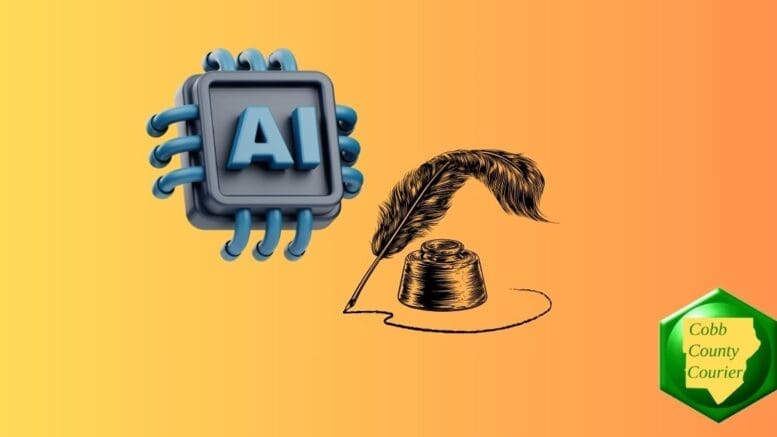By John A. Tures, Professor of Political Science, LaGrange College
In the battle between artificial intelligence and humans, there’s no bigger arena to compare the two than one of creativity. Can artificial intelligence outperform humans in writing? And if so, does it matter? Additionally, what can humans do when challenged this way?
As Mike Pearl on Mashable posts “[I]t feels like a vulnerable moment for humans who write. And the well-known propensity for programs like ChatGPT to write passable — if uninspiring — prose is well documented….ChatGPT’s parent company OpenAI has renewed our collective sense that AI companies are on a mission to put people out of work.”
Writing for Fox Print Editorial, Tiffany Yates Martin states “Not long after ChatGPT was widely unveiled I asked the artificial-intelligence program directly what AI means for writers, and I wrote about its responses and my impressions in this post. I conjectured that given the speed of machine learning, it was inevitable that sooner rather than later, AI would be able to create credible facsimiles of human-generated writing, and indeed that’s already happening.”
I decided to put myself to the test to see if I could tell the difference between human and A.I. writing . The Society for Classical Poets’ website (by Evan Mantyk and Mike Bryant) challenges you to spot the differences between humans versus what has been created by Generative A.I. They give examples of (a) a Villanelle, (b) a Limerick, (c) a Haiku and (d) a Sonnet, where you had to determine which of 2-4 offerings were done by a human.
I only got one of four correctly identified as human. I couldn’t tell the difference between A.I. and a human when analyzing several forms of poetry.
If A.I. can write as well as humans, what chance do we have? Tiffany Yates Martin adds “49 news outlets, including major ones like CNET and Buzzfeed, that are regularly incorporating AI-generated articles into their content. And both these companies have recently made significant staffing cuts, which they profess not to be related, but it’s hard to think that they’re not.” Pearl brings up the shuttering of Vice and the L.A. Times working in A.I., alongside staffing cuts.
But before we hand over our sword on the field of battle, or battleship, it’s better to look more closely at the comparison tests. There’s a big reason I couldn’t understand the difference between human and A.I. poetry: I don’t know much about poetry. Poetry is often provided without any context, and can easily slip by the uneducated reader.
I gave the same test to an expert, my wife, who teaches language arts in middle school. She got three of four right in guessing which were human-made, and her second choice for her lone wrong guess was the human version. I asked how she could tell, and she stated “A.I. was focused more on being technically precise according to the “rules” of the form, whereas the human examples focused on creativity and passion, making a connection (and my oldest kid, who took my wife in middle school years ago, got 2 of 4 right).
I know most writers will probably balk at such an assignment. Humans should be dazzled by the mystery of it all. But if it’s about making a human connection, then poetry or literary fiction that is too abstract will be missed by such readers, who may prefer the comfort of the simpler, and more easily explained, A.I. writing.
In my next column, I look at how well artificial intelligence performs when it is given the chance to replace humans. Are such bots up to the task of replacing human work? How can humans stay ahead of the machines? I provide some clues to each of these.
John A. Tures is a professor of political science at LaGrange College in LaGrange, Georgia. His views are his own. He can be reached at jtures@lagrange.edu. His “X” account is JohnTures2.
